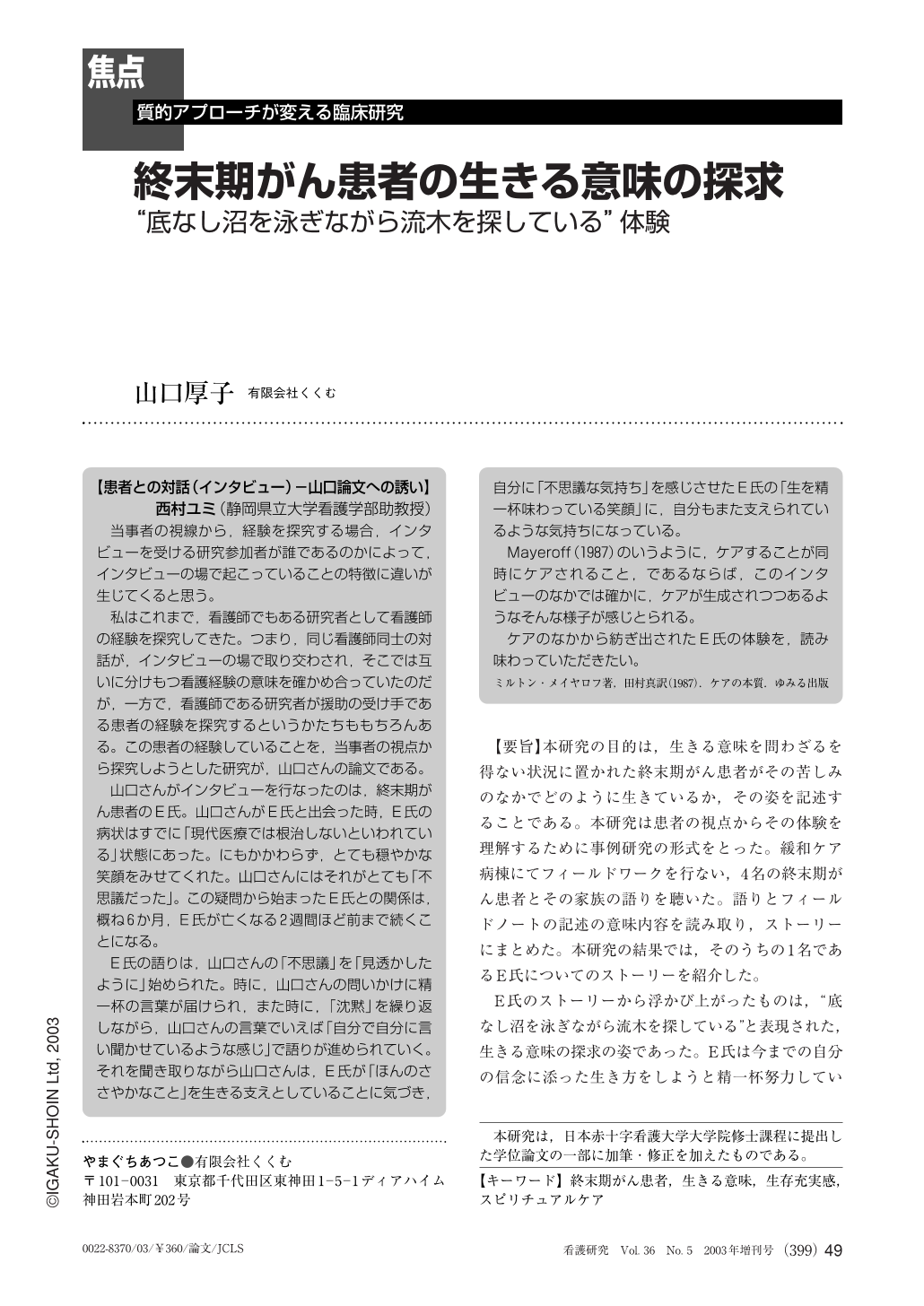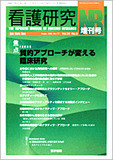Japanese
English
- 有料閲覧
- Abstract 文献概要
- 1ページ目 Look Inside
- サイト内被引用 Cited by
【患者との対話(インタビュー)-山口論文への誘い】 西村ユミ(静岡県立大学看護学部助教授)
当事者の視線から,経験を探究する場合,インタビューを受ける研究参加者が誰であるのかによって,インタビューの場で起こっていることの特徴に違いが生じてくると思う。
私はこれまで,看護師でもある研究者として看護師の経験を探究してきた。つまり,同じ看護師同士の対話が,インタビューの場で取り交わされ,そこでは互いに分けもつ看護経験の意味を確かめ合っていたのだが,一方で,看護師である研究者が援助の受け手である患者の経験を探究するというかたちももちろんある。この患者の経験していることを,当事者の視点から探究しようとした研究が,山口さんの論文である。
山口さんがインタビューを行なったのは,終末期がん患者のE氏。山口さんがE氏と出会った時,E氏の病状はすでに「現代医療では根治しないといわれている」状態にあった。にもかかわらず,とても穏やかな笑顔をみせてくれた。山口さんにはそれがとても「不思議だった」。この疑問から始まったE氏との関係は,概ね6か月,E氏が亡くなる2週間ほど前まで続くことになる。
E氏の語りは,山口さんの「不思議」を「見透かしたように」始められた。時に,山口さんの問いかけに精一杯の言葉が届けられ,また時に,「沈黙」を繰り返しながら,山口さんの言葉でいえば「自分で自分に言い聞かせているような感じ」で語りが進められていく。それを聞き取りながら山口さんは,E氏が「ほんのささやかなこと」を生きる支えとしていることに気づき,自分に「不思議な気持ち」を感じさせたE氏の「生を精一杯味わっている笑顔」に,自分もまた支えられているような気持ちになっている。
Mayeroff(1987)のいうように,ケアすることが同時にケアされること,であるならば,このインタビューのなかでは確かに,ケアが生成されつつあるようなそんな様子が感じとられる。
ケアのなかから紡ぎ出されたE氏の体験を,読み味わっていただきたい。
ミルトン・メイヤロフ著,田村真訳(1987).ケアの本質.ゆみる出版
This paper aims to describe a terminal cancer patient who finds himself having to question the meaning of living in the midst of his pain. With a view to understanding the experience from the patient's perspective, the research takes the form of a case study.
Field work was conducted in a palliative care ward, in which the researcher listened to four terminal cancer patients and their families talking. The researcher then extracted the meaning from the record of the narration and the field notes, and compiled the content into the form of a story, focusing particularly on Mr. E, one of the four patients.
What emerges from the story is a search for the meaning of living that could be expressed as “a search for some kind of support while swimming through a bottomless swamp”. Mr. E had hitherto made every possible effort to live a life that was in accordance with his own beliefs. But as death drew closer, it became increasingly difficult to stick to these beliefs, and a struggle developed. Within the context of this struggle, Mr. E discovered his own identity in the links with his family. In addition, unpretentious everyday experiences brought to Mr. E a sense of fulfillment, which in turn became a support as he struggled with his pain.
The findings suggest that the scope of spiritual care for terminal term cancer patients can be extended by offering everyday nursing support while focusing on the sense of fulfillment.

Copyright © 2003, Igaku-Shoin Ltd. All rights reserved.


